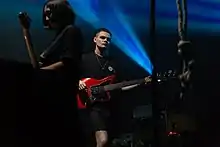Lebanon Hanover
Lebanon Hanover are a British-German post-punk duo formed in 2010 in Sunderland, England. The band consists of Swiss vocalist and guitarist Larissa Iceglass and British vocalist, bassist and synthesist William Maybelline.[1]
Lebanon Hanover | |
|---|---|
 Lebanon Hanover performing at Wave-Gotik-Treffen festival in Germany in 2017 | |
| Background information | |
| Origin | Sunderland, England |
| Genres | |
| Years active | 2010–present |
| Labels | Fabrika Records |
| Members |
|
| Website | https://www.lebanonhanover.com/ |
The group is signed to Greece's Fabrika Records and has released six studio albums to date. Their name comes from two neighbouring towns (Lebanon and Hanover) in New Hampshire, United States.[2]
History
Band members Larissa Iceglass (born Larissa Georgiou) and William Maybelline (born William Morris), who lived in Berlin, Germany and Newcastle, England, respectively at the time, met each other through the music social media website Last.fm, where they traded 80s music recommendations with each other. In 2010, Iceglass travelled to Sunderland to meet Maybelline in person for the first time, and the two formed Lebanon Hanover soon after, naming the band after two towns in New Hampshire.[3]
Lebanon Hanover played its first show in October 2010 at Berlin's King Kong Club.[4] In 2011, they released a split EP with La Fete Triste, which caught the eye of Fabrika Records, and the band was signed to the label shortly after. The band released their debut album The World is Getting Colder in 2012. They released their second album, Why Not Just Be Solo, on Halloween later that same year. The duo moved back to Maybelline's parents' house to begin work on their third album, Tomb for Two, which was described as marking the end of a trilogy. The single "Gallowdance" from the album received heavy play in clubs around the time, and the album was released in 2013. However, upon touring North America, the band was banned from entering the United States following two Canadian dates, forcing the cancellation of the rest of their American dates.[4] Iceglass and Maybelline split romantically in 2013, with Iceglass remaining in Berlin as Maybelline resided in Greece.[5]
The band's fourth album Besides the Abyss was released in 2015, followed by their fifth album Let Them Be Alien in 2018. Iceglass moved to Greece during the making of that record, having grown bored of Berlin.[6] It also featured a stylistic change, incorporating elements of black metal, shoegaze and neofolk.[5] In 2019, the band announced another United States tour, which was cancelled a month before because their visa request was denied by the United States government.[7] The band's sixth album, Sci-Fi Sky, was released in 2020 and supported by the singles "The Last Thing" and "Digital Ocean".[8]
In 2023, the band played multiple European festivals including Primavera Sound and Wave-Gotik-Treffen.[9]
Style
Lebanon Hanover's music has been compared to 1980s gothic rock and post-punk acts such as Siouxsie and the Banshees, The Cure and Bauhaus. The band has a minimal, dark sound.[10] Their songs have a signature light synth sound, deep bass and melancholic lyrics.[11]
William Maybelline is responsible for the rhythm, synthesizer and bass, which add to the music like an ordered frame, while contributing with more chaotic fragments. As a common conceptual idea, it simply describes simple production, which is based on the desire to generate an organic sound as possible.[12]
Discography
- 2011: Lebanon Hanover / La Fete Triste (Split-EP with La Fete Triste)
- 2012: The World Is Getting Colder (Album, Fabrika Records)
- 2012: Why Not Just Be Solo (Album, Fabrika Records)
- 2013: Tomb for Two (Album, Fabrika Records / Dead Scarlet Records / Mecanica Records)
- 2013: Gallowdance (Single)
- 2015: Besides the Abyss (Album, Fabrika Records)
- 2016: Babes of the 80s (Single, Fabrika Records)
- 2017: Lebanon Hanover Anthology (Compilation-EP, GAG TAPE)
- 2018: Let Them Be Alien (Album, Fabrika Records)
- 2020: Sci-Fi Sky (Album, Fabrika Records)
See also
- She Past Away, a Turkish post-punk/dark wave band
References
- "LEBANON HANOVER - interview by Peek-A-Boo magazine".
- "Behind Lebanon Hanover's Gothic Exterior Reside Gentle Souls".
- "Behind Lebanon Hanover's Gothic Exterior Reside Gentle Souls". That's Online. Retrieved 2022-12-22.
- "2013 - 2010". www.lebanonhanover.com. Retrieved 2022-12-22.
- Online, R. T. L. (13 November 2020). "Lebanon Hanover im Interview zu ihrem neuen Album "Sci-Fi Sky"". RTL Online (in German). Retrieved 2022-12-22.
- tomarnstein (2019-09-03). ""Berlin Ceased to Spark Joy": Cold Wave Purists Lebanon Hanover Talk Breaking New Ground". www.thebeijinger.com. Retrieved 2022-12-22.
- "Lebanon Hanover - Dear fans, dear promoters, It's with..." www.facebook.com. Retrieved 2022-12-22.
- post-punk.com (2020-09-04). "Lebanon Hanover Dive into the "Digital Ocean" with Their Latest Video from Sci-Fi Sky". Post-Punk.com. Retrieved 2022-12-22.
- "Primavera Sound Madrid 2023: Lineup + How to Get Tickets". Retrieved 2023-09-18.
- "LEBANON HANOVER - interview by Peek-A-Boo magazine".
- "Lebanon Hanover - Besides the Abyss (Vö. 15.02.2015)". 17 February 2015.
- "Lebanon Hanover - Secret Thirteen Interview | Secret Thirteen". 17 March 2013.